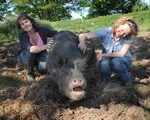It’s easy to be tempted. You see a pen of squealing little piglets and, as you want them NOW, you agree to take them, whatever they look like.
The basic rules for assessing animal health are much the same, whatever the species and wherever you choose to buy – from a private seller or at auction. Never buy anything which looks too quiet, or under the weather. It’s a common mistake to buy something that looks a bit sorry for itself, thinking that you can nurse it back to tip-top condition, but your purchase could end up costing you a fortune in veterinary fees.
Don’t buy if they:
- are lethargic, reluctant to stand, have dull eyes or drooping heads;
- have discharge from eyes or nose; are coughing or sneezing;
- have blackness inside the ears or are shaking their heads, indicating presence of mites;
- are scouring (i.e. diarrhoea), which could be caused by internal parasites or serious disease;
- have poor coats/skins, dull or scruffy hair, bald patches, scabs.
- have lameness, stiff limbs, or other signs which suggest the animal is in pain.
Buying from private sellers
For every one really good breeder, there will be many more who haven’t got a clue what they are doing. It is up to YOU to make sure that what you are buying is fit and healthy, so make sure you go through the health checklist above to make sure you’re not throwing your money away.
Never buy a single pig, unless you already have others that it can live with. Pigs are herd animals and need the company of their own kind. Keeping a lone pig is simply cruel. If you are buying pigs as pets, don’t assume they will be happy living in your house – they will wreck the place. Quite simply, they need to be outdoors in order to express normal behaviour. Never buy uncastrated boars, because they will become boistrous and potentially dangerous as they mature.
As a general rule, NEVER buy from someone who offers to bring the pigs to you – unless you have previously seen them on the farm. A seller may suggest you meet in a car park or lay-by, giving a plausible-sounding reason (they are on their way somewhere, or access to the farm is tricky) but don’t fall for it. You must insist on seeing the pigs where they were born and reared – and on seeing the parents.
Take a good look at the living conditions. Farms and smallholdings are rarely spotless and tidy, but barns used to house sows and litters should be relatively clean, with evidence of regular mucking out and replenishment of straw. Look at the general condition of the other pigs in the herd, their behaviour, and watch for any scratching or signs of redness which could be as a result of repeated rubbing to relieve itching.
If in doubt about what you are being offered, walk away. You may desperately want to take some weaners back with you that day, but you could be taking home a whole lot of problems, too.
And don’t forget…
Before you make arrangements to collect your pigs you must give the seller your County Parish Holding (CPH) number and contact details in order that he or she can fill out the electronic movement form (eAML2 – see the BPEX website www.eaml2.org.uk ).
NEVER buy pigs from a seller who says the movement does not need to be recorded – it does!
You will also need:
- Safe and suitable transport with which to take your pigs home
- A Certificate of Competence and Transporter Authorisation if the journey is more than 65km (40miles) or longer than eight hours
- Back home – a securely-fenced area with shelter from the extremes of weather
- Suitable living accommodation, complete with bedding
- Food and containers. Ask the seller for a small amount of the food they have been given to mix with whatever you plan to give them. This will help them to switch diets without too much upset
- A constant water supply or way of making sure that the pigs are never left thirsty, along with suitable drinking vessels which can’t be easily tipped over.

 To find out more about smallholding or owning pigs, why not purchase a copy of Liz’s informative books? Find out more on her website here
To find out more about smallholding or owning pigs, why not purchase a copy of Liz’s informative books? Find out more on her website here

